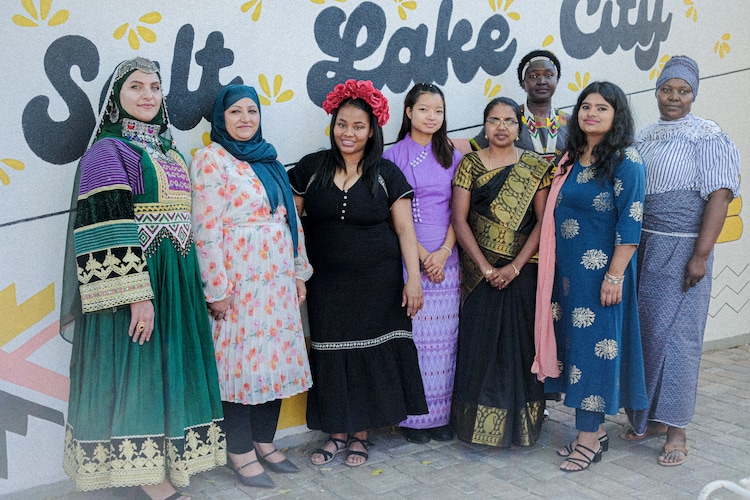Fatima Rahman moved to Utah from Afghanistan on July 26, 2003. She remembers the exact date, and lists it off with enthusiasm.
She taps that same enthusiasm as she shows off videos on her phone of her time going through the RISE Culinary Institute program in Salt Lake City.
Rahman is one of 10 immigrant and refugee students who will graduate Friday as part of the program’s second cohort, which includes women from India, Nepal, Colombia, Thailand, South Sudan, Nigeria, Afghanistan and Venezuela. The program seeks to help students break into the restaurant world.

(Nico Santos) Eight of 10 women graduating from the second cohort of the RISE Culinary Institute program.
RISE, a nonprofit, launched in 2023 and serves as a training kitchen and school in the back of the Sugar House location of Saffron Valley, which is owned by immigrant and entrepreneur Lavanya Mahate.
On Friday, Mahate will host a celebration and fundraising event for the program at 163 Pierpont Ave., called Rise Together Social Dinner. It will feature a photo exhibition from photographer Nico Santos called “Stories from Afar,” which captures the graduates and their journeys. There will also be food and performances from cultural dance groups. Tickets can be purchased online.
One student’s rise to graduation
Rahman, who left Afghanistan as a refugee, is often sad when she thinks of her home country. Her cousin was killed there, one of her brothers has escaped to Iran, and her older brother was killed by the Taliban. She sends a portion of the money she earns back home to her family members.
When she moved to Utah, she didn’t know any English beyond basic greetings, but after she received permission to work for a cookie company in Ogden, she started picking up the language by watching interactions others had. She also picked up some Spanish, she said, because that was the language her coworkers used.
(Trent Nelson | The Salt Lake Tribune) Fatima Rahman at Saffron Valley in Salt Lake City on Tuesday, Oct. 8, 2024.
Rahman took some years off from working when her son was born, and after the COVID-19 pandemic, she had trouble finding a stable job.
She learned about RISE from Samira Harnish, who runs a South Salt Lake-based organization called Women of the World, which seeks to educate and empower refugee and immigrant women. After completing RISE’s coursework, Rahman said Mahate helped her find two culinary jobs, one of them at The Blended Table.
Prior to going through the RISE program, Rahman was already well versed in the art of traditional Afghani food, and was used to cooking for big groups because she often cooks for refugee centers.
Still, Rahman hoped to gain knowledge about working in the professional culinary industry in Utah.
Creating new opportunities
The RISE kitchen is a cozy space, yet big enough to encourage hands-on learning. Outside the entry door, there’s a black decal on the wall that reads, “We rise by lifting others.”
Mahate has said the program started as a result of a labor shortage in Utah’s restaurant industry, and amid a growing population of refugees and new residents — people who “are willing and able to work and just need the resources or the training to get a job in the culinary field.”
Trainees come to the program through refugee services. The goal is to help get them placed with a restaurant for six months in a paid internship position, and then ultimately get hired full-time by the restaurant.
Mahate said the first cohort of the program launched last January with 10 people signing up but only five participating. The second cohort started in June.
She attributes the dropout rate to other challenges women might be facing.
“They have a lot of challenges,” Mahate said. “Even though there’s the need and the interest, some of them don’t have child care or other things that they’re really having to deal with before they can think about furthering their career and doing things that will help them.”
The course lasts three months, from Mondays to Thursdays, 10 a.m. to 3 p.m., and the curriculum includes obtaining a food handler’s permit, learning safety and sanitation guidelines, food preparation procedures and techniques of French classical cooking.
(Trent Nelson | The Salt Lake Tribune) Vanesa Trespalacios at RISE Culinary Institute in Salt Lake City on Tuesday, Oct. 8, 2024.
For students like Vanesa Trespalacios, who is from Colombia, RISE helps even seasoned home cooks learn new things.
“I discovered many new ingredients that were not seen in Colombia,” Trespalacios said. “This helped me a lot to present my final dish that gave a very good result. But the truth is that I learned things that I did not know, and I feel that today and later, they will help me serve.”
In the future, Mahate wants to add other elements to the coursework, like financial literacy and immigration law classes, so trainees have a well-rounded education.
“I’ve seen the program transform the lives of some of the women firsthand,” Mahate said. “They come very apprehensive and kind of little bit closed off, but then by the end of the cohort, they’re just so happy and confident.”
Mahate said the next cohort will start in the second week of January and applications are open. Details are available on RISE’s website, riseculinaryinstitute.org.
(Trent Nelson | The Salt Lake Tribune) RISE Culinary Institute in Salt Lake City on Tuesday, Oct. 8, 2024.









